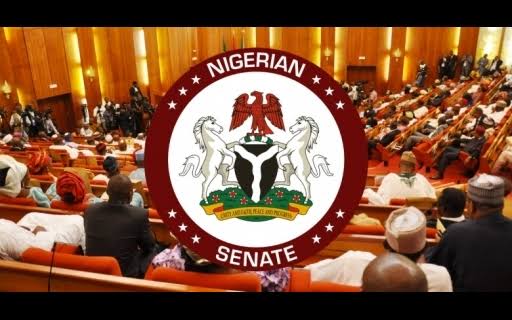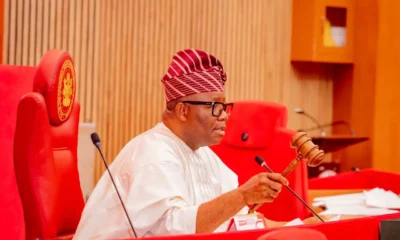News
BREAKING: Nigerian Senate Moves To Counter ‘Christian Genocide’ Narrative, Says Violence Not Religious, To Engage U.S. Lawmakers, Others

The Nigerian Senate is set to debate a motion seeking to correct what it describes as “dangerous misrepresentations” of the country’s security challenges as a campaign of “Christian genocide.”
The motion, titled “Urgent Need to Correct Misconceptions Regarding the Purported ‘Christian Genocide’ Narrative in Nigeria and International Communities,” was sponsored by Senator Mohammed Ali Ndume (Borno South) and co-sponsored by Senators Sani Musa (Niger East), Magatakarda Wamako (Sokoto North), Ibrahim Bomai (Yobe South), Ahmed Aliyu Wadada (Nasarawa West), and several others.
In the draft motion seen by SaharaReporters, Senator Ndume expressed concern over what he described as “increasing circulation of misleading narratives” in both local and international spaces, alleging a systematic genocide against Christians in Nigeria.
While acknowledging the tragic and unacceptable attacks suffered by Christian communities in various parts of the country, Ndume emphasised that violence in Nigeria has affected citizens of all faiths, including Muslims and adherents of other religions.
He warned that mischaracterising the ongoing security crisis in purely religious terms “risks inflaming sectarian divisions, distorting international understanding, and undermining national unity.”
Senate Motion Says Violence Affects Christians, Muslims, Others
In the motion, the Senate noted that Nigeria remains a multi-ethnic and multi-religious nation whose unity depends on responsible communication and accurate representation of facts.
It expressed concern that certain foreign media outlets, advocacy groups, and religious networks have amplified the “Christian genocide” narrative without adequate verification.
The motion further observed that the nation’s security challenges, including terrorism, insurgency, banditry, communal clashes, and criminal violence, have resulted in the loss of lives and property among both Christian and Muslim communities.
“The Senate notes that Nigeria has in recent years faced serious security challenges, including terrorism, insurgency, banditry, communal conflicts, and targeted attacks, which have affected citizens across various religious, ethnic, and regional backgrounds, resulting in loss of lives and property among both Christian and Muslim communities,” it said.
Citing the 1999 Constitution (as amended), the motion reaffirmed that the Nigerian government has a constitutional obligation to secure the lives and property of all citizens, irrespective of their faith or ethnicity.
Concern Over U.S. Designation
The Senate also expressed worry over recent developments in the United States Congress and Senate, where efforts are reportedly underway to designate Nigeria as a “Country of Particular Concern (CPC)” over alleged religious persecution.
The lawmakers warned that such international misperceptions could have serious diplomatic and economic consequences for Nigeria.
Senate Resolutions
In its resolutions, the Senate firmly rejected what it described as the blanket characterisation of Nigeria’s security situation as a “Christian genocide.”
The lawmakers maintained that the country’s ongoing conflicts are rooted in a mix of socio-economic, ethnic, criminal, and terrorist factors that transcend religion.
The upper chamber called on the Federal Government, particularly the Ministry of Foreign Affairs and relevant security agencies, to adopt a data-driven approach to public communication, including the release of verified casualty figures, contextual reports, and investigative findings to counter the spread of misinformation locally and abroad.
The Senate further appealed to religious leaders, civil society organisations, and the Nigerian media to exercise restraint and responsibility in their public statements and reporting, cautioning that inflammatory language or exaggerated narratives could exacerbate sectarian tensions.
Similarly, the lawmakers urged foreign embassies, international organisations, and media outlets to rely on verified, balanced, and credible sources, such as official security agencies, local communities, and independent observers, when reporting on religiously sensitive issues in Nigeria.
To strengthen this effort, the Senate mandated its Committees on Foreign Affairs, Information, and National Security and Intelligence to collaborate with the Executive branch of government in developing a coordinated national communication strategy aimed at clarifying misinformation about religious violence.
The committees are also expected to engage with the U.S. Congress, international partners, and Nigerian diaspora groups through official briefings and fact-based publications to correct prevailing misconceptions about the country’s security realities.
“The Senate resolves to engage US Senate and Congress; International partners and Diaspora networks through official briefings and fact-based publications to correct misconceptions,” it said.
In addition, the lawmakers emphasised the need to support interfaith peacebuilding initiatives that promote understanding, highlight shared experiences of victims across faiths, and reinforce national unity.
Finally, the Senate urged the Federal Government to ensure justice and accountability for all victims of violent attacks, regardless of religion or ethnicity, as a critical step toward addressing impunity and rebuilding public confidence in state institutions.
If adopted, the Senate’s resolutions are expected to form the basis of a coordinated diplomatic and public information effort aimed at correcting international opinions about religious violence in Nigeria.
US Expresses ‘Deep Concern’ Over Attacks On Christians
The United States recently expressed “deep concern” over the persistent violence targeting Christians and other vulnerable groups in Nigeria, urging the government in Abuja to take stronger measures to protect its citizens from terrorist attacks.
The statement followed remarks by American comedian Bill Maher, who highlighted the growing number of Christians killed by extremist groups, including Boko Haram and ISIS-West Africa.
In a statement to Newsweek, the US State Department confirmed it had repeatedly raised the issue with the Nigerian government at the highest levels.
Maher recently blasted Western media for ignoring what he described as the ongoing genocide against Christians in Nigeria.
Speaking on his HBO show Real Time with Bill Maher on Friday, September 26, Maher accused news outlets and political elites of deliberately staying silent while Boko Haram, Islamic State in West Africa Province (ISWAP), and Fulani militias slaughter Christians and raze churches across Nigeria.
“Nigeria, the fact that this issue has not gotten on people’s radar, it’s pretty amazing,” Maher said. “If you don’t know what’s going on in Nigeria, your media sources suck. You are in a bubble.”
The comedian, who is an outspoken critic of religion but often uses his platform to highlight uncomfortable truths, compared the violence to a full-scale genocide.
“I’m not a Christian, but they are systematically killing the Christians in Nigeria. They’ve killed over a hundred thousand since 2009. They’ve burned 18,000 churches. These are the Islamists, Boko Haram. This is so much more of a genocide attempt than what is going on in Gaza. They are literally attempting to wipe out the Christian population of an entire country,” he said.
During the show, U.S. Congresswoman Nancy Mace (Republican, South Carolina) thanked Maher for raising the alarm, stressing that the media had failed to cover the crisis with the urgency it deserves.
Nigerian Govt Debunks ‘Christian Genocide’ Reports
However, the Nigerian Government has dismissed reports suggesting that terrorists in Nigeria are carrying out a systematic genocide against Christians, describing such claims as “false, baseless, despicable, and divisive.”
In a press statement, the Minister of Information and National Orientation, Mohammed Idris, described portraying Nigeria’s security challenges as a targeted campaign against a single religious group as “a gross misrepresentation of reality.”
The minister stressed that terrorist groups target people of all faiths.
“The violent activities of terrorist groups are not confined to any particular religious or ethnic community. These criminals target all who reject their murderous ideology, regardless of faith. Muslims, Christians, and even those who do not identify with any religion have suffered at their hands,” he said. (SaharaReporters)
-

 News23 hours ago
News23 hours agoSenate Passes Electoral Act Amendment Bill
-

 Business22 hours ago
Business22 hours agoThere Was Pressure To Keep Refineries Running Despite Monumental Losses – Ojulari
-

 Metro22 hours ago
Metro22 hours agoAdamawa Court Arraigns Two For Booing Governor Fintiri At Political Gathering, Imposes Stringent Bail Conditions
-

 News23 hours ago
News23 hours agoNnamdi Kanu appeals conviction, faults terrorism trial
-

 Politics23 hours ago
Politics23 hours agoQuit partisan politics – Adamawa Rep advises Atiku
-

 Business23 hours ago
Business23 hours agoCBN reforms, rising oil prices lift FX fortunes
-

 Metro22 hours ago
Metro22 hours agoPolice invite kingmakers over bribery allegation in Awujale selection process
-

 News23 hours ago
News23 hours agoFG decries slow pace of free meter rollout


















